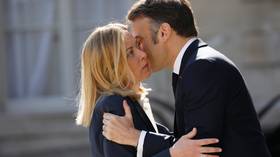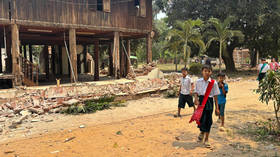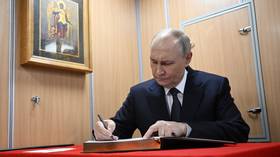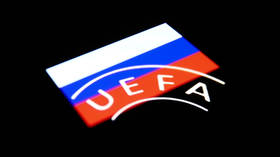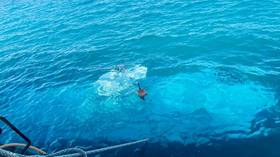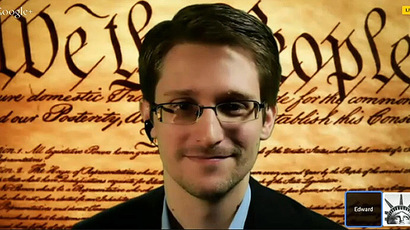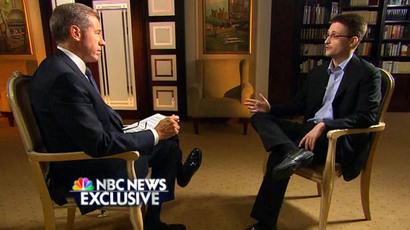Snowden: 'If I end up in chains in Guantanamo I can live with that'
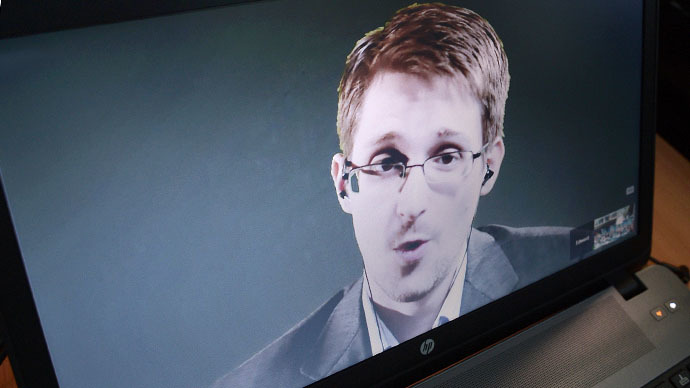
“If I end up in chains in Guantanamo I can live with that,” Edward Snowden, the former intelligence contractor-turned-privacy advocate, told the Guardian newspaper during a recent interview released in part by the paper on Thursday.
Guardian editor-in-chief Alan Rusbridger and reporter Ewen MacAskill spent seven hours conducting an interview in Moscow earlier this month with Snowden, a former analyst for the United States National Security Agency now wanted in the US for espionage, and the newspaper plans to publish the full conversation at the end of the week.
Ahead of Friday’s release, the paper has published excerpts and a video of their July 10 interview with Snowden, and in it the former NSA worker stands by his decision last year to disclose US secrets to the media and advocates further for professionals around the world to adopt new security practices as government across the globe increasingly engage in surveillance against their own citizens.
Additionally, Snowden claims for the first time in his latest interview that a culture exists among his former NSA staffers in which US spies “routinely” share with one another “intimate, nude photos” of people in “sexually compromising” situations that the government was never intended to see.
Previously, classified NSA documents leaked to the press by Snowden, now 31, have unveiled spy operations conducted by the US and its allies that have targeted entire nations, religious communities and sectors, at times collaterally picking up private details about innocent Americans and foreigners alike whose communications are incidentally gathered due to any which affiliation with targets of the agency.
After Snowden chose to identify himself as the source responsible for last year’s blockbuster NSA disclosures, he ended up in Moscow last July when his US passport was revoked by the Department of State as he was en route to Central America from Hong Kong. Now nearly one year after the Russian Federation first granted Snowden asylum, the NSA leaker’s latest interview with The Guardian is one of only a few discussions he’s had at length with the press since his revelations began to spark an international discussion on surveillance.
“I haven’t really been scared like I thought I might be,” Snowden told the journalists of his time so far in Moscow. “I’m much happier here in Russia than I would be facing an unfair trial in which I can’t even present a public interest defense to a jury of my peers,” he said. “I feel very fortunate to have received asylum.”
Snowden also rejected claims that he’s in cahoots with the Moscow, dismissing allegations that he is a Russian spy by telling the Guardian that such claims are “bullshit.”
“If the [US] government had the tiniest indication — the tiniest shred of evidence that, not even that I was working for the Russian government, that I was associating with the Russian government — it would be on the front page of the New York Times by lunchtime,” he said.
At the same time, Snowden even went as far as to condemn recent legislation from the Kremlin by saying he “disapprove[s] of the majority of the recent laws in Russia on internet censorship and surveillance.”
Now more than a year after he ended up in Moscow on accident, Snowden said he is now using his free time to design encryption tools because, according to him, “Anyone who has an obligation to protect the privacy and interests of their clients is facing a new and challenging world” that warrants the development of new standards and implements.
In particular, Snowden said, advancing surveillance technologies have allowed for journalists around the globe to come under attack by oppressive governments uninterested in having their secrets shared.
"An unfortunate side effect of the development of all these new surveillance technologies is that the work of journalism has become immeasurably harder than it ever has been in the past," he told the Guardian. "Journalists have to be particularly conscious about any sort of network signalling, any sort of connection, any sort of license plate reading device that they pass on their way to a meeting point, any place they use their credit card, any place they take their phone, any email contact they have with the source because that very first contact, before encrypted communications are established, is enough to give it all away."
In calling for training and new standards for all professionals working with sensitive details, Snowden called "to make sure that we have mechanisms to ensure that the average member of our society can have a reasonable measure of faith in the skills of all the members of these professions."
Earlier this year, Snowden said during an address delivered remotely to a tech conference in Texas that “We need to think about encryption not as this sort of arcane, black art,” but rather “a basic protection.”
“The United States government has assembled a massive investigation team into me personally, into my work with the journalists, and they still have no idea what documents were provided to the journalist, what they have, what they don’t have, because encryption works,” he said at the time.
And although Snowden insisted that personal information like health records and sources should be protected, he warned that images shared by people whose communications are even incidentally collected by the NSA should be concerned about having their pictures ogled at random analysts.
According to Snowden, naked photos of innocent people are shared among staffers at the NSA. “Sooner or later this person’s whole life has been seen by all of these other people,” he said. “It’s never reported. Nobody ever knows about it because the autoing of these systems is incredibly weak.”
Young #NSA works share intimate nude photos - seen as "fringe benefits" of surveillance job - Snowden. Never audited
— alan rusbridger (@arusbridger) July 17, 2014
“Records of your intimate moments have been taken from your private communications,” Snowden said, “…and given to the government without any specific authorization….is itself a violation of your rights.”
“Why is that in a government database?” he asked.
The Guardian plans to publish the rest of its interview with Snowden on Friday this week.




